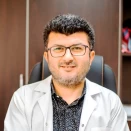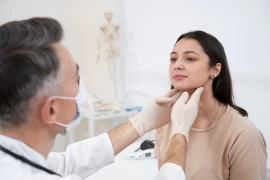
Pancreatic Cancer
- Pancreatic Cancer
- What is the pancreas and what does it do?
- Why Does Pancreatic Cancer Occur?
- What Are the Symptoms of Pancreatic Cancer?
- What should be done to prevent the formation of pancreatic cancer?
- What Are the Types of Pancreatic Cancer?
- What are the Treatment Methods for Pancreatic Cancer?
What is the pancreas and what does it do?
The pancreas is an organ in the digestive system that produces both digestive enzymes and hormones. It is located in the upper left part of the human body, between the stomach and the duodenum.
The pancreas has two main functions: producing digestive enzymes and secreting hormones.
- Digestive Enzymes: The pancreas produces some enzymes used during digestion. These enzymes help digest fats, proteins and carbohydrates. These digestive enzymes help digest food in the small intestines.
- Hormones: The pancreas also produces and secretes hormones. The most important of these hormones are insulin and glucagon. The hormone insulin is necessary to control blood sugar levels. When the blood sugar level rises, the pancreas produces the hormone insulin. The hormone glucagon is used to prevent blood sugar levels from falling.
These two functions of the pancreas are vital for the digestion, use and conversion of nutrients in the body. Any disruption in pancreatic functions can cause digestive problems, diabetes, and other health problems.
Why Does Pancreatic Cancer Occur?
The exact causes of pancreatic cancer are not known exactly. However, research shows that certain risk factors increase the likelihood of developing pancreatic cancer. These risk factors are:
- Age: The risk of pancreatic cancer increases with age.
- Smoking: Smoking is the most important factor that increases the risk of pancreatic cancer.
- Excessive Alcohol Consumption: Alcohol consumption can also increase the risk of pancreatic cancer.
- Family History: Pancreatic cancer is more common in those with a family history of cancer.
- Obesity: People with a high body mass index (BMI) may have an increased risk of pancreatic cancer.
- Diabetes: The risk of pancreatic cancer may increase in diabetic patients.
- Chronic Pancreatitis: Inflammation of the pancreas is known as chronic pancreatitis and this disease can increase the risk of developing pancreatic cancer.
What Are the Symptoms of Pancreatic Cancer?
Pancreatic cancer usually does not show symptoms in the early stages, and by the time symptoms appear, the cancer is usually in advanced stages. However, the following symptoms may occur if pancreatic cancer occurs:
Abdominal pain: Pancreatic cancer usually causes severe pain in the abdomen. This pain may get worse, especially after eating.
Weight loss: Pancreatic cancer can cause loss of appetite and weight loss. These symptoms become more pronounced in the advanced stages of cancer.
Loss of appetite: Pancreatic cancer can cause loss of appetite. This symptom becomes more pronounced in the advanced stages of cancer.
Jaundice: Pancreatic cancer can cause jaundice by blocking the bile ducts. Jaundice is characterized by yellowing of the skin and eyes, dark urine and light-colored stools.
Nausea and vomiting: Pancreatic cancer can cause nausea and vomiting. These symptoms become more pronounced in the advanced stages of cancer.
Fatigue: Pancreatic cancer can cause fatigue. This symptom becomes more pronounced in the advanced stages of cancer.
These symptoms may not always be associated with pancreatic cancer, but it is important to see a doctor immediately when they occur. Early detection can make treatment more effective and prevent the spread of the disease.
What should be done to prevent the formation of pancreatic cancer?
Although it is not possible to completely prevent pancreatic cancer, you can reduce risk factors by adopting some healthy living habits. Here are some things you can do to prevent pancreatic cancer:
- Adopt a healthy diet: Adopt a low-fat, fruit and vegetable diet. Avoid unhealthy foods such as trans fats and processed foods. Take care to consume more fiber foods.
- Do not smoke: Smoking is the most important factor that increases the risk of pancreatic cancer. Quitting smoking is one of the most important steps in reducing your risk of pancreatic cancer.
- Limit alcohol consumption: Alcohol consumption can also increase the risk of pancreatic cancer. Consuming one or two alcoholic drinks a day is considered a healthy limit.
- Maintain a healthy weight: Obesity can increase the risk of pancreatic cancer. Try to maintain a healthy weight.
- Exercise: Regular exercise can reduce your risk of pancreatic cancer. Make sure to get at least 150 minutes of moderate-intensity exercise a week.
- Manage stress: Stress can increase the risk of pancreatic cancer. Practice techniques such as yoga, meditation or breathing exercises to manage stress.
- Have regular health check-ups: It is important that people who are at high risk due to family history or other risk factors have regular medical check-ups. Regular health checks are important for early diagnosis and treatment.
What Are the Types of Pancreatic Cancer?
Pancreatic cancer can be divided into several subtypes originating from different cell types. The most common type of pancreatic cancer is adenocarcinoma, which occurs in the lining of the pancreas (exocrine). Tumors in the endocrine part of the pancreas are rare. Here are the main types of pancreatic cancer:
- Adenocarcinoma: It is a type of cancer that occurs in the inner part of the pancreas. This type of cancer accounts for about 95% of pancreatic cancer.
- Endocrine tumors: These are tumors formed in the endocrine cells of the pancreas. Endocrine tumors arise from cells that produce hormones and are rare.
- Cystic tumors: These are tumors that occur in cysts inside the pancreas. The vast majority of these tumors are not cancerous, but some may be cancerous.
- Solid pseudopapillary tumors: It is a rare type of pancreatic cancer. It usually affects young women and has a low level of aggression.
Each case of pancreatic cancer may be different, and treatment options and prognosis may vary depending on the type and stage of cancer.
What are the Treatment Methods for Pancreatic Cancer?
Pancreatic cancer treatment may vary depending on the type and stage of the cancer and the general health of the patient. While treatment may be more effective in the early stages of cancer, treatment options may be limited in advanced stages. Pancreatic cancer treatment options may include:
- Surgery: It is the most widely used method for the treatment of pancreatic cancer. Surgery involves removing the area where the cancer is located. Surgical options include the Whipple procedure (removal of part of the pancreas and other nearby tissue including the gallbladder, small intestine, and sometimes stomach), distal pancreatectomy (removal of the tail of the pancreas), and total pancreatectomy (removal of the entire pancreas).
- Radiotherapy: Radiotherapy uses high-energy radiation to kill cancer cells. During treatment, cancer cells are targeted and tried to be killed.
- Chemotherapy: Chemotherapy involves the use of drugs to slow the growth or kill cancer cells. This treatment is used in advanced stages of cancer.
- Immunotherapy: Immunotherapy is treated using drugs that allow cancer cells to be recognized by the body's immune system and target cancer cells.
- Targeted therapies: Targeted therapies are treated using drugs used to kill cancer cells by targeting specific proteins or genetic mutations in cancer cells.
Treatment options and prognosis can vary depending on the type and stage of cancer. Therefore, after a diagnosis of pancreatic cancer is made, it is important to seek advice from a specialist on treatment options.
Don't be afraid of cancer, be afraid of being late...





